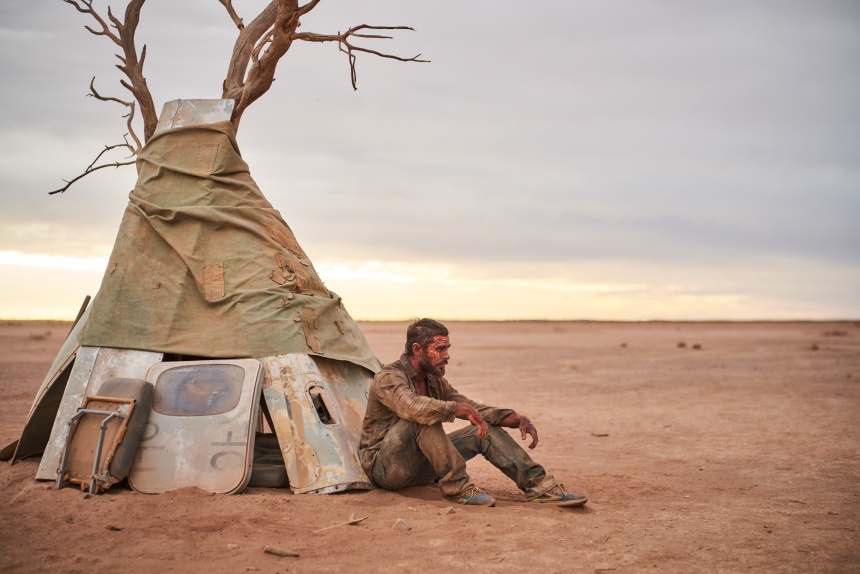Gold
⭐⭐⭐
Rating: R
Run Time: 1 hour 37 minutes
Stars: Zac Efron, Anthony Hayes, Susie Porter
Writers: Anthony Hayes, Polly Smyth
Director: Anthony Hayes
In Theaters and Streaming
Movie making didn’t stop during the height of COVID-19. In fact, the practical limitations that were imposed on the art — the need for social distancing, small crews, and condensed or sporadic shooting schedules — gave rise to what we may someday consider an entire genre of film, what we might call “COVID Cinema.”
Gold, a new thriller starring Zac Efron, is a classic example. Best described as “Waiting for Godot meets Mad Max,” it’s a wide-open-spaces, post-Apocalyptic drama in which the smattering of characters seldom, if ever, violate the rules of social distancing while barely setting foot in an enclosed space together. Yet, perhaps as a commentary on the germaphobic paranoia that gripped the world for the past two years, even here distance does not guarantee safety, as the folks in Gold still manage to inflict awful abuse upon each other — even from binocular range.
Efron plays a nameless drifter (the credits refer to him only as “Man One”), trudging along a dusty road on a vast desert landscape of Australian Outback. As he explains to a guy running a remote general store that seems to sell absolutely nothing, he’s on his way to something called The Compound, a place that offers vague promises of a better life.
For the final leg of the multiple-day journey, Man One gets a lift in a badly abused pickup truck from Man Two (director and co-writer Anthony Hayes), a bearded, blustery mercenary soldier-type who warns Man One that The Compound ain’t all it’s cracked up to be.
Man One insists, though, so off they go, sweating and swearing into the barren wilderness.
Of course, the vehicle breaks down, and that’s when Man One discovers, poking through the desert floor, a grapefruit-sized hunk of solid gold. Frantically excavating with hand tools, Men One and Two are astonished to find themselves staring at a gold boulder the size of a living room couch.
The pickup won’t budge the thing, so there’s just one thing left to do: Head to the nearest settlement — a two-day drive away — fetch an excavator, and return to dig up the gleaming prize.
But how will they guard their find and protect it from interlopers? Now, you and I may reason: No problem, the gold has been sitting there exposed since the last Ice Age. What are the chances that someone else will happen upon it in the next 48 hours? Just drive together to town, taking note of how far down the road you’ve traveled, collect the digger and then retrace your route.
Alas, that line of reasoning does not occur to Man One and Man Two. They agree that Man One will remain to keep watch over the gold while Man Two, who knows the area, will go get the heavy equipment.
And so Man Two disappears over the horizon, his pickup leaving a swirling cloud of dust, as Man One settles in for a long, hot, choking vigil with only the twisted trunk of a long-dead tree to provide a smidgen of shade (an unmistakable allusion to the sole piece of scenery in Samuel Beckett’s Godot).
From this moment, Gold becomes Efron’s one-man show. Through excruciating close-ups, blinding cinematography and nerve-jangling sound design, Man One’s desert tribulations unfold like a passion play from No Man’s Land. Battling sun, hunger, thirst, and a blinding sand storm, Man One scratches for survival. Each time he seems ready to simply let the desert swallow him alive, he drags himself to that mound of dirty gold for reassurance of salvation of the most temporal kind.
The days crawl by, moving slower than the scorpions under Man One’s feet. By day he faces down a wandering woman (Susie Porter), whose company and help he rejects, and by night he tends a fire to ward off the dingoes that will rip him to shreds if they sense a smidgen of vulnerability.
Every so often, Man One’s satellite phone rings with an update from Man Two: He’s on his way. He’s been delayed. He’s lost. He thinks he’s close. And every so often, he lets slip a word or two that implies he just might not have Man One’s best interests at heart.
Clocking in at a snappy hour-and-a-half, Gold efficiently measures precisely how much detail we need for the set-up, how long we’re willing to endure Man One’s desert ordeal, and how swiftly to deliver its head-turning denouement.
Ragged and rapid as a desert rat, Gold is what I like to call a poison dart of a film: precisely pointed and gratifyingly lethal.
Featured image: Zac Efron in Gold (Screen Media)
Become a Saturday Evening Post member and enjoy unlimited access. Subscribe now



